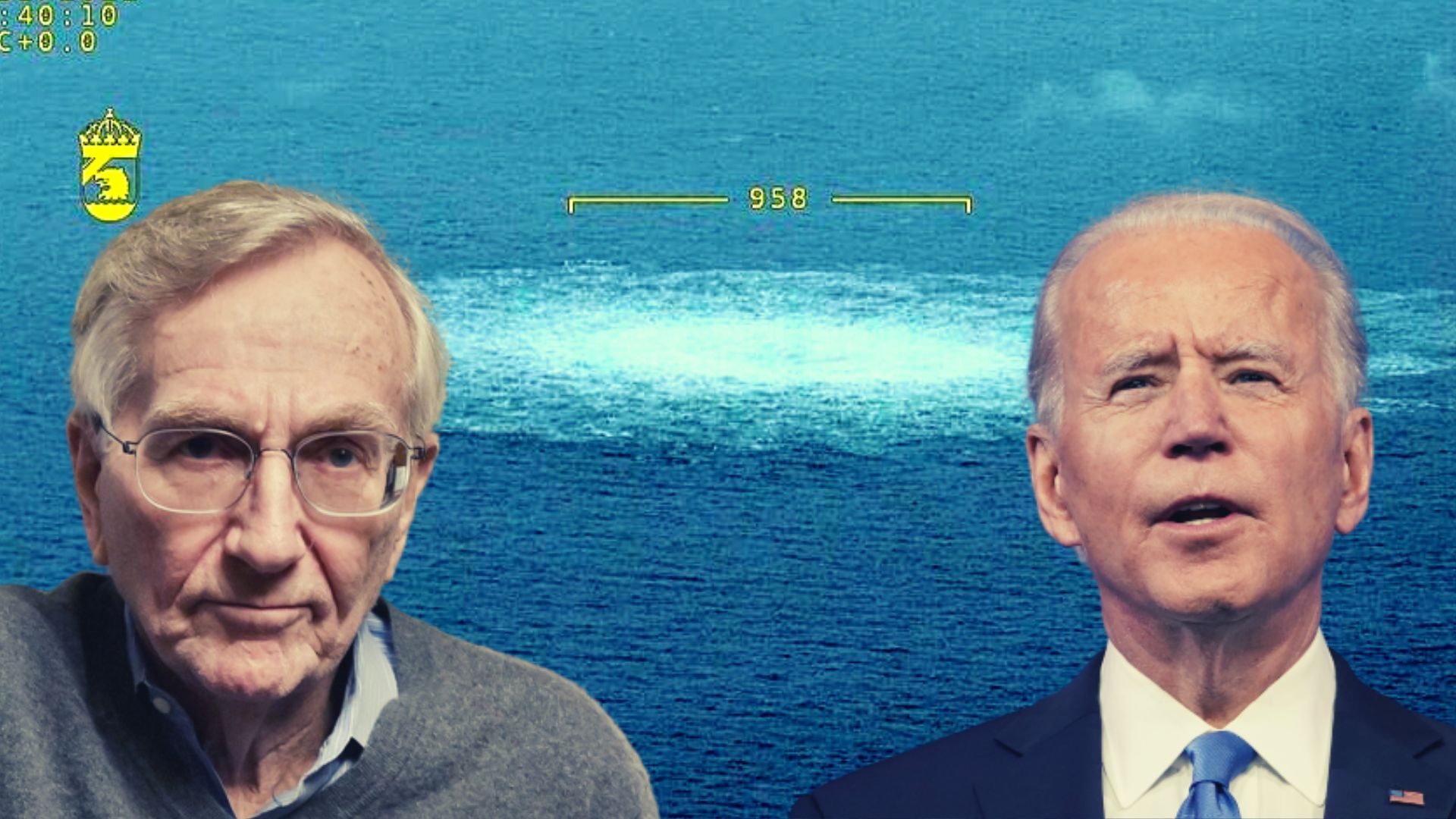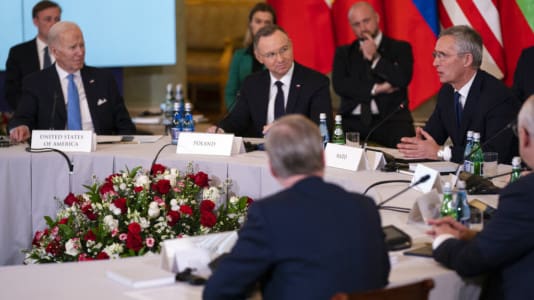A report that the Biden administration blew up the Nord Stream gas pipelines running from Germany to Russia, with the help of Norway, is being billed the biggest story the majority of the global media is trying its best to ignore. However, some countries, security experts, former government officials, and even a number of top European newspapers are refusing to let the explosive claims be buried by the next news cycle, with calls for an international investigation growing louder.
Of course, Russia was the first country pushing aggressively for an investigation, and China was not far behind. In an illustration of China’s skeptical position on the issue, Wang Wenbin, spokesman of the Chinese Ministry of Foreign Affairs, said: “What has perplexed people is that officials and media of the United States have remained unusually silent on this, and related European countries also seem to be heavy in misgivings. These abnormal reactions make it more convincing that the Nord Stream explosions are extremely complex. Given the seriousness of the criminal act of undermining a major transnational infrastructure facility and its grave consequences, the international community is entitled to demand a thorough investigation.”
However, what is more interesting is Europe’s reaction to the report from Pulitzer Prize winning journalist Seymour Hersh fingering the Biden administration as the culprit behind the Nord Stream sabotage. After all, Russia and China are hardly going to sway public opinion in the West.
It is first worth addressing what the German press is saying about the sabotage attack and Hersh’s reporting, as Germany is arguably the Western country most affected. The country’s press has produced a wide variety of responses, but the mainstream has been overwhelmingly dismissive. German state media outlet Taggeschau is perhaps typical, first running no story on Hersh’s reporting only to run a fact check pointing out that Hersh only used one source and that it would be implausible for ships to carry out such a mission during a naval exercise.
Germany’s Die Welt, one of the country’s top media outlets, has perhaps some of the most interesting reporting on the topic in the German media. The paper has implied that an air of mystery surrounds the explosion, writing, “The fact that blog entries such as Hersh’s get such a wide response is probably due to the fact that the investigating authorities hardly release any information to the public. Welt has been researching the attack for months; numerous inquiries were made to authorities and government agencies,” which have so far produced very little in terms of results.
However, the paper pointed to the German government’s seeming nonchalance about an attack on the country’s vital infrastructure. For example, Welt wrote that at a meeting of 16 state ministers and Federal Interior Minister Nancy Faeser in late November, the issue of the Nord Stream attack was only a “marginal topic.”
A high-ranking police official, who did not want to be quoted by name, told Welt during a break at that meeting: “Not only the Russians are possible perpetrators, but also Western countries.”
It is worth noting that if there was even a whiff of evidence Russia was involved, it would have likely leaked already at this point. The Washington Post has also reported that there is no “conclusive evidence” Russia was behind the attack, and of course, the results of the investigations being conducted may take years, and even if any conclusions are made, they may never be released to the public.
Even before Hersh’s report, the investigation into the Nord Stream explosions had raised some serious questions. The Swedish government, for example, has refused to conduct a joint investigation with the German government — a strange stance for a European ally.
[pp id=65652]
Welt detailed how it has approached numerous sources, including the Federal Criminal Police Office (BKA), federal prosecutor Peter Frank, the Federal Intelligence Service (BND), most of whom have remained extremely tight-lipped about the status of the investigation.
According to Welt, German politicians in the Bundestag who are members of the Parliamentary Control Committee (PKGr) have also had information withheld from them, allegedly for reasons related to “the good of the state.”
Some of these politicians are growing frustrated with the investigation’s course. PKGr chairman Konstantin von Notz told Tagesspiegel news outlet that the federal government “must break its silence very soon, create transparency or at least present a plausible account of the events of September 26.” He added that in a constitutional state, the public has a right to know what really happened.
Welt actually reached out to Hersh, who grew combative when Welt asked him if the story was possible Russian disinformation. The paper also confirmed that he has seen no documents related to the attack, but Welt appears to make a much bigger issue out of this than it really is. The entire German media complex, for example, had very little problem repeating the endless assertions about Donald Trump using anonymous sources that featured no “documents” and often turned out to be completely false. Welt stated that Hersh referred to the paper as asking “stupid,” “idiotic” and “provocative” questions. While there is no transcript of the conversation, Hersh allegedly said he now knows even more than he did before and has not yet published all that he knows.
Hersh’s report was first published on Feb. 8, where he wrote that U.S. Navy divers, under direction from the CIA, planted C4 explosives targeting the pipes in June 2022. The divers used the widely publicized mid-summer NATO exercise known as BALTOPS 22 as cover for their operation. After the explosives were planted, a Norwegian Navy P8 surveillance plane on Sept 26 dropped a sonar buoy that sent a signal to detonate the C4 three months later.
Welt also questioned details of Hersh’s report, with experts claiming Norway’s navy does not have the plane model described by Hersh, only the air force does. Many experts also point out that there is no “public data” describing the ships and aircraft in the area contained in Hersh’s report. While this is certainly worth noting, and other publications have done so as well, the U.S. may very well have turned off ship transponders or taken other covert action to hide this data from the public.
What is being said in Europe outside Germany?
Most European newspapers, especially those aligned with the EU mainstream, have been quick to either downplay or outright dismiss Hersh’s report, just as the German media has. However, some news outlets are raising questions about any potential role of the U.S. in the attack.
Swiss newspaper Le Temps, considered the top French-language newspaper in Switzerland, appears to entertain the notion that Hersh’s reporting may be pointing to the responsible culprit even if there is no corroborating evidence yet, writing, “It is suspected that the U.S. used the pretext of war to destroy the Nord Stream pipelines once and for all, so as to replace Russian gas with American gas and make Europe permanently dependent on its energy. (…) Joe Biden publicly stated in February 2022: ‘If Russia invades Ukraine, there will be no longer a Nord Stream 2, we will bring an end to it.’ … Seven months later, the time had come! The evidence is only circumstantial and there is no proof, but there is still room for doubt.”
Spanish publication CTXT argues that reporting on the issue has been strangely silent, writing, “Hersh’s investigation may have certain flaws, but it has fundamental value: it relaunches the debate about the Biden administration’s role in the Ukraine war.”
The paper also points out that “the non-existent media coverage of the Nord Stream explosion is just one symptom that something is really wrong in Western democracies. The resignation of the EU countries and their large media outlets not to investigate or even talk about sabotage — surely the most revealing international incident of the conflict between Russia, Ukraine, Europe and NATO so far — confirms the ability of Washington, which has outsourced to the European Union all the costs and none of the benefits of Putin’s war, to impose its law and its narrative.”
Hungary’s Magyar Nemzet, like many other European papers, considers the possibility that Hersh’s story is inaccurate or even outright false. Nevertheless, the Hungarian paper argues that the U.S. at least had the motive to blow the pipelines, writing:
“The Pulitzer Prize winner could of course be mistaken, as could his sources — or they may even be deliberately making false claims. However, it does not seem particularly likely that at the age of 85, this journalist would want to destroy his reputation with a huge newspaper hoax. (…) Irrespective of what happened with Nord Stream: the U.S. has a geopolitical interest in separating Germany from Russia and at the same time ending Germany’s energy dependence on Russia. There are also financial interests: (…) The U.S. shale gas sector, which was previously losing money, made a profit of $200 billion last year thanks to high energy prices.”
Some scholars and former government officials are also entertaining the possibility that the U.S. sabotaged the pipelines. Stephan Ossenkopp, a German scholar of the Schiller Institute, said if the allegations are true that the U.S. blew up the pipelines, it amounts to a terrorist act.
“Anybody who read this article by Seymour Hersh last Wednesday must be totally stunned by the lawlessness of the United States government, especially President Joe Biden towards the German government and a privately owned commercial enterprise like the Nord Stream 1 and 2 gas pipelines. Cheap Russian gas is the lifeline, has been the lifeline for German production, the chemical industry, (and) households,” said Ossenkiopp. “So just imagine that if this was true, it means that the American government has created a terrorist act, committed a terrorist act against vital German infrastructure. This is a scandal of the utmost seriousness.”
Ossenkopp indicates that the U.S. had a clear motive for such a covert action, with German and Russian relations in mind.
“The purpose of the U.S. is to contain the rise of Germany through this incident. Because if Germany becomes powerful and has good relations with Russia, it will be unacceptable for the U.S. It will be a powerful and perilous adversary for American hegemony. In my opinion, American hegemony is over, and it’s time to build a new multipolar world, in which small countries and big countries other than the U.S. all have a voice. America should adapt to this.”
Alain Corvez, former adviser to the French defense and interior ministries, claimed in an interview with Chinese media that initial reports that Russia likely blew up the pipelines were an example of the U.S. leading Europe’s media around by the nose.
“The U.S. wants to lead the media, especially the European media that are dealing with an energy crisis, to believe that it was the Russians who blew up the Nord Stream pipelines. And now we’re almost certain it wasn’t the Russians. In addition, the U.S. investigation into the incident has not been concluded, but it is no longer being pursued. The investigation has led to no conclusions because the builders of the Nord Stream pipelines were not allowed to participate in the investigation.”
It is worth noting that just as the West’s dominant media likely has an interest in covering up any potential U.S. involvement in the explosion, Chinese media obviously also has an interest in promoting the U.S. as a culprit. Nevertheless, it is useful to explore ideas around the explosion from a wide variety of sources.
Corvez adds that if the U.S. military and the president are really involved, such a sabotage operation would be understood as NATO strategy. He describes that cutting off economic ties between Russia and the rest of Europe has long been a U.S. foreign policy goal, especially in relation to Germany.
Corvez clearly thinks the U.S. is behind the attack, which is likely far too premature a conclusion. However, Corvez does raise an interesting point that cannot be denied: The ones investigating the incident may be the ones most interested in making sure the truth behind the sabotage never comes to light.
“This investigation has so far come up without any findings. I think the conclusion is at the end of Seymour Hersh’s article, that the incident was a terrorist attack organized by Western countries. There will be no official announcement of the results, because the investigators are, per se, the perpetrators of the incident.”
Does Western media really want to the truth?
At the same time, there are serious questions about Western media and its role in any investigation. The liberal establishment that dominates the biggest Western media outlets know that any information about a U.S. role in the Nord Stream pipeline sabotage would be a political shock felt around the world. As Remix News has already reported, such a revelation would very likely fuel the rise of parties such as the Alternative for Germany (AfD) in Germany and other populist and nationalist parties across Europe. It would also call into question the entire structure of NATO, with allies attacking each other’s vital infrastructure.
As a result, how willing are the West’s media outlets really willing to pursue these questions, and perhaps even more importantly, how far would they be willing to run cover for the Biden administration if it indeed behind such an operation?
There is, after all, some precedent for this type of question. The Spanish CTXT publication reaches back into the past to highlight how journalists across the world were hoodwinked over the issue of weapons of mass destruction in Iraq, and that same scenario could also play out with the Nord Stream pipeline bombings:
We are witnessing a new and alarming episode of abandonment of functions and collective self-censorship that is very reminiscent of what happened when the Bush Administration forced the New York Times, and then by osmosis all other serious Western media outlets, to swallow without question that there were weapons of mass destruction in Iraq. Years later, when the Times political correspondent (Judith Miller) was found to be a willing collaborator with the Bush administration, the newspaper had to apologize to its readers. But no one seems to have wanted or been able to learn that lesson.
The Spanish paper ends by asking whether the press can withstand pressure from the United States and work outside the “comfort of the consensus narrative.”
It could eventually turn out in the end that Hersh was wrong about the details of the attack but right about the ultimate culprit. It could also turn out that another Western power was behind the explosion. There are many potentially uncomfortable scenarios for the Western media establishment. However, if the West was actually behind the attack, the world should not expect to learn the truth from the New York Times, the Guardian, Taggesschau or CNN.





